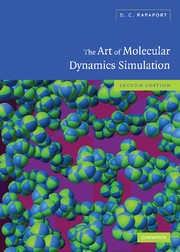Book contents
- Frontmatter
- Contents
- Preface to the first edition
- Preface to the second edition
- About the software
- 1 Introduction
- 2 Basic molecular dynamics
- 3 Simulating simple systems
- 4 Equilibrium properties of simple fluids
- 5 Dynamical properties of simple fluids
- 6 Alternative ensembles
- 7 Nonequilibrium dynamics
- 8 Rigid molecules
- 9 Flexible molecules
- 10 Geometrically constrained molecules
- 11 Internal coordinates
- 12 Many-body interactions
- 13 Long-range interactions
- 14 Step potentials
- 15 Time-dependent phenomena
- 16 Granular dynamics
- 17 Algorithms for supercomputers
- 18 More about software
- 19 The future
- Appendix
- References
- Function index
- Index
- Colophon
19 - The future
Published online by Cambridge University Press: 28 February 2011
- Frontmatter
- Contents
- Preface to the first edition
- Preface to the second edition
- About the software
- 1 Introduction
- 2 Basic molecular dynamics
- 3 Simulating simple systems
- 4 Equilibrium properties of simple fluids
- 5 Dynamical properties of simple fluids
- 6 Alternative ensembles
- 7 Nonequilibrium dynamics
- 8 Rigid molecules
- 9 Flexible molecules
- 10 Geometrically constrained molecules
- 11 Internal coordinates
- 12 Many-body interactions
- 13 Long-range interactions
- 14 Step potentials
- 15 Time-dependent phenomena
- 16 Granular dynamics
- 17 Algorithms for supercomputers
- 18 More about software
- 19 The future
- Appendix
- References
- Function index
- Index
- Colophon
Summary
Role of simulation
Computer simulation in general, and molecular dynamics in particular, represent a new scientific methodology. Instead of adopting the traditional theoretical practice of constructing layer upon layer of assumption and approximation, this modern alternative attacks the original problem in all its detail. Unfortunately, phenomena that are primarily quantum mechanical in nature still present conceptual and technical obstacles, but, insofar as classical problems are concerned, the simulational approach is advancing as rapidly as computer technology permits. For this class of problem, the limits of what can be achieved remain well beyond the horizon.
Theoretical breakthroughs involve both new concepts and the mathematical tools with which to develop them. Most of the major theoretical advances of the just-finished twentieth century rest upon mathematical foundations developed during the preceding century, if not earlier. Whether still undeveloped mathematical tools and new concepts will ever replace the information presently only obtainable by computer simulation, or whether the simulation is the solution, is something only the future can tell. Whether computer modeling will become an integral part of theoretical science, or whether it will continue to exist independently, is also a big unknown. After all, theory, as we know it, has not been around for very long.
To what extent can simulation replace experiment? In the more general sense, this is already happening in engineering fields, where models are routinely constructed from well-established foundations.
- Type
- Chapter
- Information
- The Art of Molecular Dynamics Simulation , pp. 505 - 508Publisher: Cambridge University PressPrint publication year: 2004



